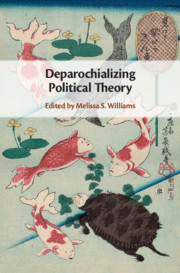Book contents
- Deparochializing Political Theory
- Deparochializing Political Theory
- Copyright page
- Dedication
- Contents
- Tables
- Contributors
- Preface and Acknowledgments
- Note on the Text
- 1 Introduction
- 2 Deparochializing Political Theory and Beyond
- 3 Recentering Political Theory, Revisited
- 4 A Decentralized Republic of Virtue
- 5 Deparochializing Political Theory from the Far Eastern Province
- 6 Is Popular Sovereignty a Useful Myth?
- 7 Authoritarian and Democratic Pathways to Meritocracy in China
- 8 Deparochializing Democratic Theory
- 9 Teaching Comparative Political Thought
- 10 Teaching Philosophy and Political Thought in Southeast Asia
- 11 Why Globalize the Curriculum?
- Index
3 - Recentering Political Theory, Revisited
On Mobile Locality, General Applicability, and the Future of Comparative Political Theory
Published online by Cambridge University Press: 15 March 2020
- Deparochializing Political Theory
- Deparochializing Political Theory
- Copyright page
- Dedication
- Contents
- Tables
- Contributors
- Preface and Acknowledgments
- Note on the Text
- 1 Introduction
- 2 Deparochializing Political Theory and Beyond
- 3 Recentering Political Theory, Revisited
- 4 A Decentralized Republic of Virtue
- 5 Deparochializing Political Theory from the Far Eastern Province
- 6 Is Popular Sovereignty a Useful Myth?
- 7 Authoritarian and Democratic Pathways to Meritocracy in China
- 8 Deparochializing Democratic Theory
- 9 Teaching Comparative Political Thought
- 10 Teaching Philosophy and Political Thought in Southeast Asia
- 11 Why Globalize the Curriculum?
- Index
Summary
Leigh Jenco’s chapter revisits the radical possibility, advanced in earlier work, that transcultural political thought can go beyond dialogue, enabling us to engage as full participants in forms of thought developed by political agents in contexts thoroughly different from our own. Others’ modes of knowledge and knowledge-seeking can become the platforms from which we innovate our own political thought and practice. In this chapter, Jenco argues that the most ambitious way of understanding the project of “deparochializing political theory” goes beyond “decentering” European thought traditions in the way we understand politics, thus making space for non-Western thought as constituent elements in this discipline we call political theory. A more thoroughgoing deparochialization of our discipline would recenter historically marginalized thought traditions as the starting point for critical inquiry and theoretical innovation, eventually yielding new theories that count as knowledge that is relevant to our own sense-making in the world, knowledge for us and not merely about them. Jenco elaborates this Gestalt-shifting approach to cross-cultural theorizing through a discussion of some of its best exemplars, including Stephen Angle’s work on sagehood and Ingrid Jordt’s work on Theravada Buddhism.
Keywords
- Type
- Chapter
- Information
- Deparochializing Political Theory , pp. 60 - 92Publisher: Cambridge University PressPrint publication year: 2020
Accessibility information
- 2
- Cited by

